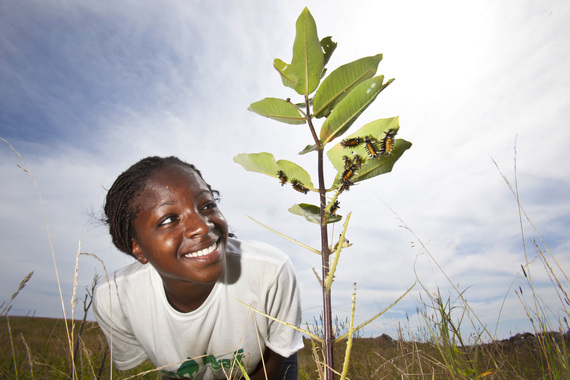
LEAF interns gain valuable first-hand conservation experience and often go on to pursue successful environmental career paths. © Karine Aigner
Mark R. Tercek is the president and CEO of the Nature Conservancy and author of Nature's Fortune. Follow Mark on Twitter @MarkTercek.
Here at the World Economic Forum, there's a lot of talk about investing in the next generation.
As leaders discuss how to improve education and tackle youth unemployment, one simple--yet powerful--tool is right outside our windows.
Getting kids outside and curious about the world around them is one of the most effective ways to build the "21st-century skills" that leaders are talking about here in Davos.
Nature inspires skills like critical thinking, problem-solving, persistence, collaboration and curiosity. Einstein walked in the woods every day at Princeton, seeking inspiration in the natural patterns and processes he saw around him. And nature literally hit Isaac Newton on the head with a big idea.
There is growing evidence that nature is perhaps the greatest living laboratory to bring science to life for young people. The National Academy of Science has found that informal, outside-the-classroom learning may be where most science learning now happens. Other studies have found that environment-based education significantly increases student test performance. And within STEM (Science, Technology, Engineering, and Math) job fields, demand for environmental scientists and engineers is growing at an unprecedented rate.
At the Nature Conservancy, I've seen firsthand the big impact nature can have on students' lives. That's why we are expanding digital learning platforms to bring nature to life for millions of students, growing opportunities for thousands of youth to take action for nature in their communities and building pathways to careers to empower hundreds of global conservation leaders.
Our Leaders in Environmental Action for the Future (LEAF) program, which provides high school students with paid summer internships in nature, is just one example with demonstrated results. Over the past 20 years, 1 in 3 of our surveyed graduates has gone on to pursue a successful environmental career path, and over half volunteer for environmental causes in their communities.
While there is no simple solution to the many challenges facing today's youth, it's clear that nature can make a big difference in building the next generation of global leaders. And the great news is - nature will be hiring. As we look for ways to empower youth leaders with the skills they will need to address the big challenges ahead, connecting to nature is more important than ever--for their sake and for the sake of our planet.
